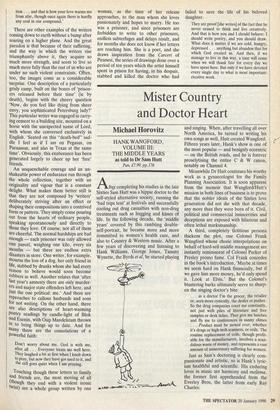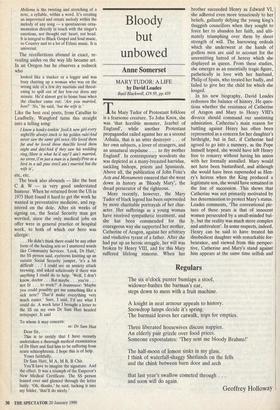Mister Country and Doctor Heart
Michael Horovitz
HANK WANGFORD, VOLUME III: THE MIDDLE YEARS as told to Dr Sam Hutt
Pan, £7.99, pp.176
Aftv completing his studies in the late Sixties Sam Hutt was a hippie doctor to the self-styled alternative society, running the `bad trips tent' at festivals and successfully cooling out drug casualties with non-drug treatments such as hugging and kisses of life. In the following decade, the 'middle years' covered by this rambling double- self-portrait, he became more and more Committed to women's health care, and also to Country & Western music. After a few years of discovering and listening to Hank Williams, George Jones, Tammy Wynette, the Byrds et al, he started playing and singing. When, after travelling all over North America, he turned to writing his own songs as well, Hutt created Wangford. Fifteen years later, Hank's show is one of the most popular — and benignly eccentric — on the British roads, and he is forever proselytising the entire C & W canon, notably on Channel 4.
Meanwhile Dr Hutt continues his worthy work as a gynaecologist for the Family Planning Association. It is soon apparent from the memoir that Wangford/Hutt's mission in both lines of business is to prove that the nobler ideals of the Sixties love generation did not die with that decade, any more than they were born of it. Civil, political and commercial insincerities and deceptions are exposed with hilarious and often lethal marksmanship.
A third, completely fictitious persona thickens the plot, one Colonel Frank Wangford whose choric interpolations on behalf of hard-sell middle management are instantly reminiscent of Colonel Parker of Presley promo fame. Col Frank concedes in the book's introduction, 'Maybe at times we seem hard on Hank financially, but if we gave him more money, he'd only spend it. Look at Elvis.' But the Colonel's blustering barks ultimately serve to sharp- en the singing doctor's bite: . . . as a doctor I'm the grocer, the retailer or, seen more cynically, the dealer or pusher. So the drug companies court me constantly, not just with piles of literature and free samples or desk tidies. They give me lunches and fly me to conferences in sunny climes . . . Product must be turned over, whether it's drugs or high-tech scanners, or coils. The routine replacement of coils, though profit- able for the manufacturers, involves a scan- dalous waste of money, and represents a vast amount of unnecessary suffering for women.
Just as Sam's doctoring is clearly com- passionate and artistic, so is Hank's lyric- ism healthful and scientific. His enduring loves in music are harmony and melisma, the former first apprehended from the Everley Bros, the latter from early Ray Charles:
Melisma is the twisting and stretching of a note, a syllable, within a word. It's creating an improvised and ornate melody within the melody of any song — a spontaneous orna- mentation directly in touch with the singer's emotions, not thought out: heart, not head. It is integral to Black Gospel and Soul music, to Country and to a lot of Ethnic music. It is universal.
The recollections abound in exact, re- vealing asides on the way life became art. In an Oregon bar he observes a redneck who looked like a trucker or a logger and was busy chatting up a woman who was on the wrong side of a few dry martinis and threat- ening to spill out of her low-cut dress any minute. He'd almost got to home base when the clincher came out: 'Are you married, hon?"No,' he said, 'but the wife is.'
Like the best oral poets, from Catullus to Leadbelly, Wangford turns this straight into a telling song:
I knew a honky-tonkin' fool/A new girl every night/ He always stuck to his golden rule/And never saw the same girl twice.lHe loved them fat and he loved them thin/ He loved them night and daylAnd if they saw his wedding ring,lHere is what he'd sayll ain't married, no sirree,lim just a man in a family/Free as a bird in a tall pine treed ain't married but the wife is',
etc, etc.
The book also abounds — like the best C & W — in very good understated humour. When he returned from the US in 1973 Hutt found it hard to get the work he wanted in preventative medicine, and reg- istered on the dole. After six weeks of signing on, the Social Security man got worried, since the only medical jobs on offer were in general practice or hospital work, to both of which our hero was allergic: . . . He didn't think there could be any other form of the healing arts so I muttered words like Community Services. 'Look, Dr Hutt,' the SS person said, eyebrows knitting up an outsize Social Security jumper, 'it's a bit
difficult . I could see an anxiety attack brewing, and asked solicitously if there was anything I could do to help. 'Well, I don't know, doctor . . . But maybe . . . you're . . . not fit . . . to work?' A brainwave: 'Maybe you could possibly get me something like a sick note? That'd make everything very much easier.' Sure, I said, I'd see what I could do. A week later I brought a letter to the SS on my own Dr Sam Hutt headed notepaper. It said To whom it may concern: re: Dr Sam Hutt Dear Sir, This is to certify that I have recently undertaken a thorough medical examination of Dr Hutt and find him to be suffering from acute schizophrenia. I hope this is of help.
Yours faithfully, Dr Sam Hutt, M A, M B, B Chin You'll have to imagine the signature. And the effect. It was a triumph of the Emperor's New Medical Certificate. The SS person leaned over and glanced through the letter lazily. 'Oh, thanks,' he said, tucking it into my folder, 'that'll do nicely.'



















































 Previous page
Previous page